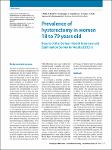Prevalence of hysterectomy in women 18 to 79 years old
Results of the German Health Interview and Examination Survey for Adults (DEGS1)
Prütz, Franziska
Knopf, Hildtraud
Lippe, Elena von der
Scheidt-Nave, Christa
Starker, Anne
Fuchs, Judith
In many countries, hysterectomy is one of the most frequently performed surgical procedures in gynaecology. The aim of this study is to analyse the prevalence of hysterectomy in Germany by sociodemographic factors and factors of (reproductive) health. Analyses are based on data from the German Health Interview and Examination Survey for Adults (DEGS1), which is part of the health monitoring of the Robert Koch Institute (RKI). The prevalence of hysterectomy among participating women (18–79 years old) was 17.5% (n=689). Most women (49.1%) were 40–49 years old when surgery was performed; 6.1% of hysterectomised women had cancer of the uterus or ovaries, and 19.7% underwent a simultaneous oophorectomy. There were significant differences in the prevalence of hysterectomy regarding social status, place of residence in 1988, number of live births, and body weight. DEGS1 is the first study showing the prevalence of hysterectomy in a representative sample of the German population. More detailed analyses of the DEGS data, among other data sources, are needed to evaluate the importance of the described associations and to assess trends.
No license information

